Pregnant women who exercise are 20% less likely to develop gestational diabetes
05/08/2018 / By Zoey Sky

According to research, working out regularly can benefit everyone, especially expectant mothers. Results from a recent study, which was spearheaded by experts from the University of Iowa (UI), revealed that expectant mothers who were in better shape before pregnancy had a lower risk of developing gestational diabetes. The researcher’s findings emphasized the need to maintain physical fitness before becoming pregnant.
Pregnancy and gestational diabetes mellitus
According to data from the Centers for Disease Control and Prevention (CDC), at least 14 percent of pregnant women in the U.S. develop gestational diabetes mellitus (GDM).
Gestational diabetes refers to a condition where women develop diabetes during the last half of pregnancy. Female patients with gestational diabetes have a higher chance of developing type 2 diabetes after giving birth.
Kara Whitaker, an assistant professor in the UI’s Department of Health and Human Physiology, said that women who want to be in better shape while pregnant could start by exercising for at least 150 minutes. Their workout can include moderate (e.g., brisk walking) to vigorous exercise (e.g., jogging) per week, and they can work out for 30 minutes every day at least five days per week. (Related: Confirmed: Exercise during pregnancy yields many benefits for both mother and baby.)
Whitaker, who is also the corresponding author for the study, noted that while women tend to be wary about their diet and exercise when they’re with child, the study proves that women can benefit from regular exercise even before they become pregnant.
Whitaker and her team examined data from 1,333 women over a 25-year period, from 1985 to 2011. The participants were enrolled in Coronary Artery Risk Development in Young Adults (CARDIA), a study at the National Heart, Lung, and Blood Institute.
The female participants accomplished seven study visits when they were first enrolled. For the visits, the participants reported if they became pregnant or gave birth and if they were diagnosed with GDM.
The researchers also supervised a fitness exam for the participants. The women were tested to see if they could walk for two-minute intervals on a treadmill at faster speeds and steeper inclines.
Throughout the study, 164 women were diagnosed with GDM. Based on this information, the researchers concluded that pre-pregnant women who were in better physical shape had at least a 21 percent reduced risk of developing gestational diabetes compared to those with lower fitness levels.
Whitaker commented, “We would expect to see this reduction in gestational diabetes risk if women had moderate improvements in fitness — going from fair to good fitness, for example.”
She continued that women who have plans of getting pregnant need to remember that staying in shape is crucial to their overall health. Whitaker noted that medical professionals could refer to the study findings if they have to recommend higher pre-pregnancy fitness to patients, particularly for those who are at higher risk for gestational diabetes.
The study’s results can also be used to leverage to address other health risks.
Erica Gunderson, an epidemiologist and senior research scientist at Kaiser Permanente Northern California, said that there are a lot of women who become pregnant and eventually develop GDM. She warned that these women already had high metabolic risk factors before their pregnancy.
Gunderson, who is also a co-author on the study, concluded, “Higher physical activity before pregnancy may lower risk of GDM by improving glucose metabolism and preventing excessive weight gain.”
When to stop exercising if you’re expecting
While physical fitness is also beneficial for expectant mothers, some women may experience symptoms which indicate that the body is under too much stress.
Take a breather immediately if you feel one or several of these symptoms:
- Blurred vision
- Decreased fetal movement
- Difficulty breathing or labored/uncomfortable breathing
- Dizziness or fainting
- Headaches, nausea, or vomiting
- Heart palpitations or pain in the chest
- Pain in the abdomen
- A sudden change in temperature, clammy hands, or feeling like your body is “overheating”
- Swelling or pain in the ankles and calves
- Vaginal bleeding or leakage of fluids
Read more articles about tips on how you can stay healthy during your pregnancy news at WomensHealth.news.
Sources include:
Tagged Under: brisk walking, diabetes, exercise, fitness, GDM, Gestational Diabetes, jogging, natural remedies, physical activity, pre-pregnancy, pre-pregnancy fitness, pregnancy, prevention, regular exercise, risk, Women's Fitness, women's health




















